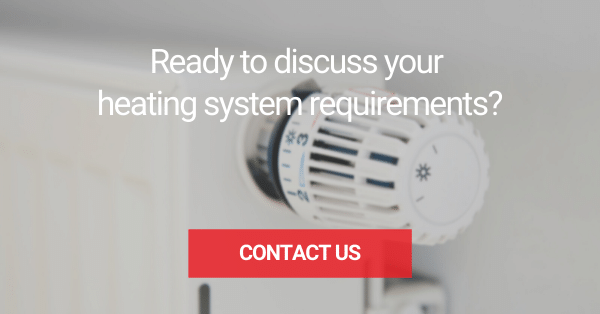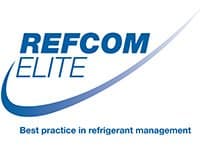As homes and businesses have a growing awareness of the impact that their activities have on the environment, there’s a growing look towards alternative ways to heat and cool properties. While there is a clear need to find alternatives to using gas and electricity created from fossil fuels, not all of the solutions are quite as ideal as they might seem. One example of this is air source heat pumps. These are being used as an example as a way to transition to a greener technology but what are the disadvantages of air source heat pumps? What might make you think twice about making this change?
Let’s take a better look at the world of air source heat pumps.
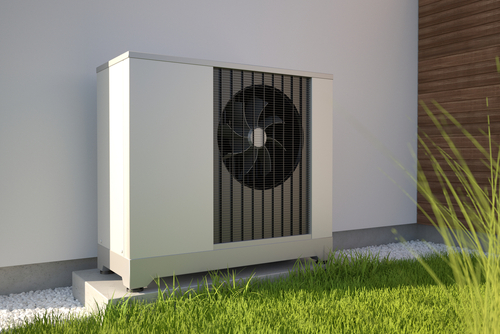
What is an air source heat pump?
An air source heat pump seems like a gift from a future version of ourselves designed to solve all of our heating problems and reduce our energy bills. It comes in a box that is about the size of a large armchair and can stand outside your property, effortlessly transforming cold outside air to hot water. This is then pumped into radiators or underfloor heating system setups – or both.
An air source heat pump can be installed in most properties in just a few days and has a lifespan of around 20 years. There isn’t a huge amount of maintenance that is needed, a yearly service and some basic cleaning.
Not only that but one of these pumps can take on the job of a gas boiler with much lower electricity requirements and less environmental damage. This means lower running costs and if you have something like solar panels on the roof, the potential for being carbon neutral. There are even government schemes to help with the upfront cost or those installation costs.
So yes, they seem very impressive on paper – why doesn’t every home already have one?
What type of air source heat pumps are there?
Before we look at how they work in a bit more detail, let’s take a moment to understand the types of air source heat pumps. There are three main types: air to water, air to air and hybrid systems.
- In the air to water heating system, a water heat pump generates heat from the air to warm the water and then this is pumped around the system including to radiators. It works well with underfloor heating because it works with lower water temperatures than radiators require.
- In an air to air system, the pump generates warm air and then this is pumped into the property through fans rather than radiators.
How does an air source heat pump work?
An air to water system draws in air from the outside and uses a liquid refrigerant, similar to those inside your fridge, to cool the air. There’s an internal pump that compresses and heats the air and then transfers it through the home heating network. Any excess hot water is then stored in a hot water cylinder for later use.
You can also get hybrid or dual option systems that can work as an air conditioning unit as well as heating. This means the air is cooled and sent around the house via fans. Some units require different air heat pumps and cooling pumps but more and more of them can do both.
A key factor is that the home needs to be well insulated in order to get the most of air heat pump systems. Without it, then the heat loss could mean the system ends up being much less energy efficient and the cost savings are lost.
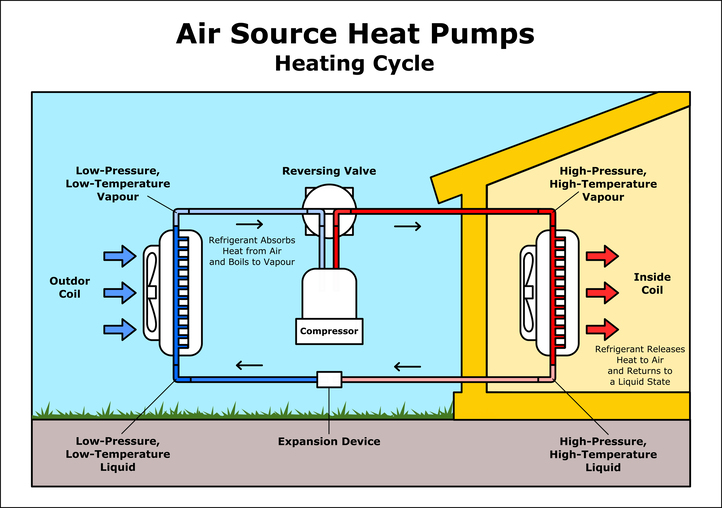
What are the disadvantages of air source heat pumps?
So on paper, these air source heat pump systems seem impressive and a sure way to solve the problems of heating homes. But there are some air source heat pumps disadvantages to consider before you dive into making the change.
Air source heat pump cost
The first thing to consider is the cost involved. The installation may be relatively quick and simple but it is expensive because there are far fewer people able to install these systems than more traditional fossil fuelled options.
While the running costs will definitely save you money in the long run, you do need to consider the upfront costs. You can pay anywhere from £3000 to £10,000 for installation, depending on the size of the property and the existing infrastructure.
However, compared to something like a biomass boiler (£15,000-20,000) or a ground source heat pump (£14,000-20,000) then it is still the most affordable renewable energy option.
Heat levels
Another issue that people using these systems report is that you simply don’t get the same level of heat that you would be used to when using a gas boiler. The best way to get the most from these systems is to use underfloor heating or to add larger radiators into rooms. However, this adds more costs to the installation price.
The heat produced does tend to be more consistent so once you have installed the radiators and have the home well insulated, it is easier to keep a more even temperature inside.
Efficiency in cold weather
For parts of the country that see more cold weather than others, efficiency could be impacted by this. Sub-zero temperatures make the heat pump have to work harder and means the efficiency savings aren’t as good as during water weather – although this is often the case for gas boilers too.
Noise levels when in operation
For some people, an issue with these systems is the noise they make when operating. They are similar to an air conditioning unit and this means placing them away from parts of the house where there are bedrooms as the noise could be enough to wake people. Not everyone finds it to be an issue but if you are noise sensitive, it is something to think about until newer, quieter models come along.
Planning permission and regulations
There are some regulations that need to be met when installing an air source heat pump. While full planning permission isn’t needed for most properties, there are things like ensuring the unit is at least a metre from the boundary that needs to be factored in. So you might still need to consult with your local planning authority.
Visible appearance
Another thing that not everyone likes is the fact that the unit is visible, standing on the outside of your house. We are used to gas boilers that hide away in the loft or an airing cupboard but this doesn’t work with an air source heat pump.
Instead, you will have a unit usually around the size of an armchair somewhere on the outside walls of your house. While they are quite tasteful in appearance for what they are, it is still something to consider.
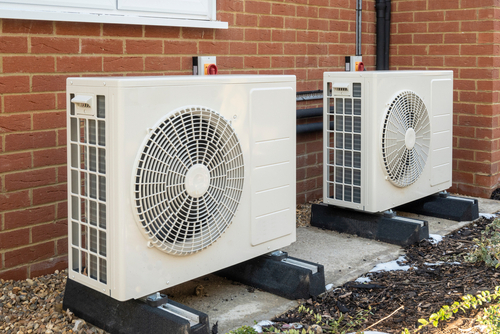
What are the advantages?
Now we’ve looked at what the potential issues are with the system, it is only fair to take a moment to consider the advantages of an air source heat pump.
Reduction in heating bills
The most interesting benefit for most of us is the chance to reduce heating bills for our home or business. Because these systems are more energy efficient, they are able to help reduce the cost of heating your home. While there are upfront installation costs to consider when working this out, running one for a few years alone can see you make a saving.
Potential to earn money from government schemes
Another interesting point is that part of the government’s push towards improving the green credentials of the UK means there are various schemes that could actually help with costs for installing the systems. Or could help with them.
For example, the Renewable Heat Incentive pays homeowners who invest in renewable technologies and can be paid quarterly for as long as seven years – which will pay back a big chunk of the initial outlay.
Ease of operation
These systems are easy to operate, work all year round and need very little maintenance. A yearly check will often be enough to keep them running smoothly and their durability means they can last 20+ years.
They work all year round, although as mentioned, colder temperatures can cause some problems with efficiency in a similar way to a gas boiler.
Is an air source heat pump worth it?
Ultimately, you are the only one you can decide if the pros and cons of an air source heat pump add up to something you want to spend your money on. While there are clear benefits, there are also some issues to consider to make sure you are clear on how these systems work.
Although there’s no doubt that the move to renewable energy is a crucial one, it is also about getting the right system for your home. If you are unsure what this might look like, TEK is here to help. We can offer our wide experience in traditional and renewable energy sources to help you make an informed decision on the best way forward for your home or business.



